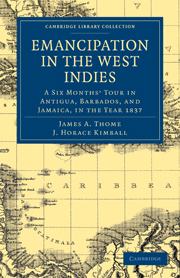 Emancipation in the West Indies
Emancipation in the West Indies INTRODUCTION
Published online by Cambridge University Press: 05 July 2011
Summary
It is hardly possible that the success of British West India Emancipation should be more conclusively proved, than it has been by the absence among us of the exultation which awaited its failure. So many thousands of the citizens of the United States, without counting slaveholders, would not have suffered their prophesyings to be falsified, if they could have found whereof to manufacture fulfilment. But it is remarkable that, even since the first of August, 1834, the evils of West India emancipation on the lips of the advocates of slavery, or, as the most of them nicely prefer to be termed, the opponents of abolition, have remained in the future tense. The bad reports of the newspapers, spiritless as they have been compared with the predictions, have been traceable, on the slightest inspection, not to emancipation, but to the illegal continuance of slavery, under the cover of its legal substitute. Not the slightest reference to the rash act, whereby the thirty thousand slaves of Antigua were immediately “turned loose,” now mingles with the croaking which strives to defend our republican slavery against argument and common sense.
The Executive Committee of the American Anti-Slavery Society, deemed it important that the silence which the proslavery press of the United States, has seemed so desirous to maintain in regard to what is strangely enough termed the “great experiment of freedom,” should be thoroughly broken up by a publication of facts and testimony collected on the spot.
- Type
- Chapter
- Information
- Emancipation in the West IndiesA Six Months’ Tour in Antigua, Barbados, and Jamaica, in the Year 1837, pp. 3 - 6Publisher: Cambridge University PressPrint publication year: 2010First published in: 1839


